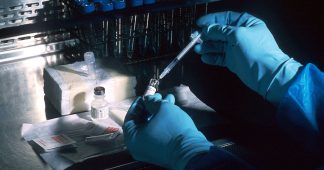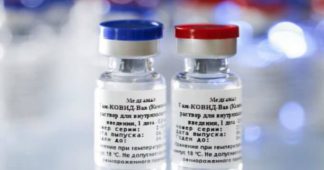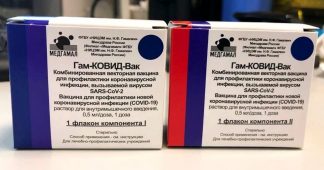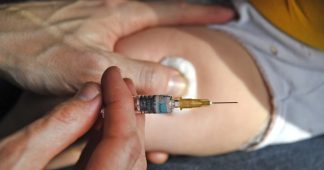25 Nov, 2020
The drug manufacturer AstraZeneca said on Monday it would seek emergency authorization for its coronavirus vaccine with various regulators. However, it might first have to answer a number of serious questions about its jab.
The British-Swedish company, which has developed its candidate vaccine together with the University of Oxford, “will begin the submission of the clinical data to regulators around the world that have a framework in place for emergency use or conditional approval,” its spokesman said on Monday, adding that the list of the regulators that will receive the application particularly includes the US Food and Drug Administration (FDA).
The statement came as the drug manufacturer published interim results of the vaccine’s clinical trials, which it said “showed the vaccine was highly effective in preventing COVID-19” and declaring its overall effectiveness to amount to 70 percent – much lower than 90-percent efficacy that other leading vaccine candidates showed.
Yet, some information published by the company appeared to be quite puzzling, while some data seemed to be lacking.
AstraZeneca might eventually find itself in need of answering key questions about its would-be jab as it rushed to get regulators’ approval for it.
1.Half dose or full dose?
The company’s assessment of its vaccine effectiveness in fact comes as an estimated average for two slightly different tests. AstraZeneca admitted in its Monday release that a group of volunteers initially got a half-dose jab, followed by afull one a month later. Another, larger, group got two full doses.
The first regimen showed 90-percent efficacy, although such results were based on analysis of slightly more than 2,700 volunteers. The second one, which involved almost 8,900 people, showed only a 62-percent efficacy.
Such a discrepancy shows that AstraZeneca has two approaches to its vaccine use, demonstrating quite different results, and that it may probably need to file for approval of each one separately.
Which one would it choose, if any? How long will the new clinical trials take, as results from these will be needed for any dose changes? Or will it stick to its “average” assessment approach?
2.Admitting mistakes?
The half-dose shots administered to a group of volunteers were, in fact, the result ofa mistake, Mene Pangalos, head of AstraZeneca’s non-oncology research and development, admitted to Reuters. Yet, this mistake went virtually unnoticed until the researchers started evaluating side-effects after the first dose.
Still, the company decided to just press on with the trials and simply to administer the second dose to those who received only half of the first one. Such an approach may be problematic with some regulators, such as the FDA, according to some analysts.
“I don’t believe that the FDA will look positively at any trial where the dose, or the age cohorts, or any other variable were changed mid-trial, inadvertently or deliberately,” Geoffrey Porges, an SVB Leerink analyst, said.
If, as Mene Pangalos says, it was a mistake, when and how did this mistake occur? Would AstraZeneca check up on its clinical trial results once again to make sure no other mistakes had creeped into its research?
3.Solving a puzzle?
One of the most perplexing statements made by AstraZeneca is that its half-dose approach seemingly proved to be more effective than the full-dose one. After all, it was the half-dose group results that showed the vaccine’s 90-percent efficacy.
A larger dosage usually produces a stronger immune response, so such results made many experts wonder. Still, the vaccine developers apparently cannot explainthe results either, at least for now.
Sarah Gilbert, an Oxford University professor of vaccinology that co-developed the vaccine together with specialists from AstraZeneca, told Bloomberg she was “surprised” by such results, adding that she was not sure if the company had the “full answer,” and citing the need to “look into it some more.”
So, would it be reasonable for AstraZeneca to seek the vaccine’s approval at a time when it is not sure why the jab works the way it works?
4.Concealing facts?
A report by Bloomberg suggested, citing Moncef Slaou, the head of the US Operation Warp Speed program, that the supposedly highly-effective half-dose regimen was administered to participants in a younger group that were no older than 55 years-old. The full-dose test, in turn, included elderly people
Yet, AstraZeneca says nothing of this in its press release, although such details could be crucial for understanding how a vaccine works, as well as for assessing its real effectiveness. The company’s silence in this instance raises a number of questions.
Why did it not disclose those facts, if they are true? Why did it not refute them, if they are false? Were there any other differences between the participants of the trials when it comes to demography or any other characteristics, such as their states of health?
5.Not enough evidence?
Results presented by AstraZeneca were based on data received from just over 11,000 participants – roughly a half of the 23,000 included in the trials. As for its supposedly highly effective half-dose regimen, it was administered to fewer than 3,000 volunteers.
Such numbers might not be enough for Phase-Three vaccine trials to be considered successful.
Apart from that, the company only mentioned that it had recorded a total of 131 Covid-19 cases among the participants, without disclosing whether anyone of those who did receive the vaccine in any dosage had contracted the disease.
Will AstraZeneca disclose additional data and possibly start new clinical trials specifically to prove the effectiveness of its half-dose regimen? The company has not yet announced any such plans.
6.Unexplained side effects?
AstraZeneca’s clinical trials have previously been briefly suspended in the UK over reports about two cases of possible autoimmune diseases linked to them. At least one of the participants was reported to have developed a serious spinal inflammatory disorder called transverse myelitis.
The person in question later reportedly recovered and the trials were resumed. However, the company has not yet provided any solid explanation for those incidents. Whether such information would be made public is still an open question.
7.Evading responsibility?
What AstraZeneca did, though, was to secure full indemnity from all damages in most countries that struck vaccine-supply deals with the company. Such agreements were reached in July, well before the somewhat puzzling test data arrived.
“This is a unique situation where we as a company simply cannot take risk if in ..four years the vaccine is showing side effects,” Ruud Dobber, a member of Astra’s senior executive team, told Reuters.
Would the drug manufacturer change its stance now and agree to share some legal risks in case any damage would emanate from its own mistakes during the clinical trials? This is particularly concerning, as there is no long-term study to date of the safety of chimpanzee adenovirus vector vaccine.
When will its long-term effects be studied and presented to the public?
Published at www.rt.com










